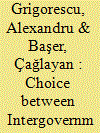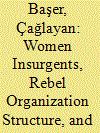| Srl | Item |
| 1 |
ID:
165595


|
|
|
|
|
| Summary/Abstract |
This article seeks to explain when governments are more likely to take an intergovernmental approach to resolving global collective problems rather than step back and encourage (or simply allow) nongovernmental actors to become the main global governors. The authors suggest that an important factor driving this choice is the domestic ideological leanings of powerful states toward greater or lesser government activism. Such ideologies connect domestic preferences to international ones. They also lead to the establishment of domestic institutions that, in turn, facilitate the emergence of international organizations. Using these arguments, the authors develop a set of inferences regarding the likelihood that governments will establish and join intergovernmental organizations. The authors test their hypotheses through a study of global governance in the education realm, and also apply a series of statistical analyses covering developments in all issue-areas over the last century and a half.
|
|
|
|
|
|
|
|
|
|
|
|
|
|
|
|
| 2 |
ID:
188192


|
|
|
|
|
| Summary/Abstract |
How do women insurgents affect rebel organizations’ structure and survivability? Scholars acknowledge the importance of organization-level dynamics and unit composition for conflict outcomes. However, our understanding of how gender-diverse cadres influence rebel survivability remains limited. I examine the mechanisms through which women sustain armed conflict. I analyze micro-organizational dynamics of rebellion through a qualitative case study of the Kurdish armed movement in Turkey between 1982 and 2015 based on the official archives of the Kurdistan Workers’ Party. I show that women insurgents enable tactical diversity, aid the organization’s coup-proofing strategy against factions, and mobilize domestic and international audiences. Women contribute most to their organization during crises and due to exploitation of gender inequalities. Analyzing the relationship between gender dynamics, group structure, and evolving rebel strategies, this study shows that the gender composition of the membership is an important factor influencing rebel survivability.
|
|
|
|
|
|
|
|
|
|
|
|
|
|
|
|